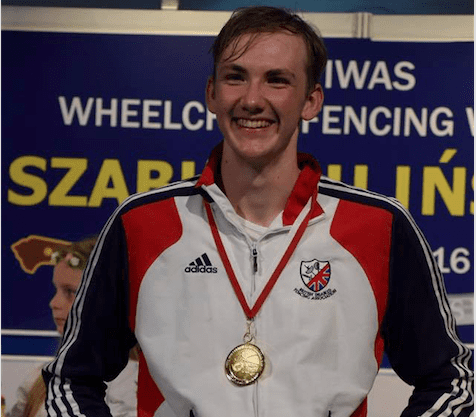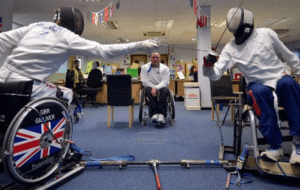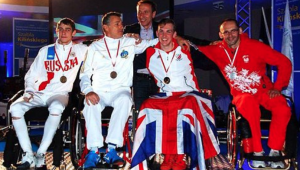1. Congratulations on making it to Rio….how long have you been working towards this moment and how is the training going?
Thank you! I first started fencing late 2010, made my international debut in Warsaw, Poland in July 2012 and won my first Medal in December 2012, taking Bronze at the IWASF World cup in Hungary and so up until that point I could only dream of Rio.
y fencing career was developing well and after winning three back-to-back World cup Gold Medals at the start of the 2016 Paralympic qualifying period, all of a sudden Rio seemed a very real possibility.
2. What’s your normal 9-5pm routine? How has this changed in preparation for the Paralympics?
It does vary a little depending on where I am training but as a rule I train 5-6 days a week. If I pick an average Thursday:
Get up between 7am, have breakfast & catch the bus from a hotel in Bath city to the University of Bath where I am based Tues-Thurs and start the days training at 8.30am with a warm-up session.
I then have coaching sessions with my coach Peter Rome and sparring with other fencers.
I fit in a lunch and then attend my Team Bath Strength & Conditioning, Physiotherapy & Sports Psychology sessions. Depending on where we are in the competition schedule, I may then fit in another sparring or coaching session before Dinner and a little down time. In the evening at 8pm I attend my fencing club – Bath Swords, finishing at 10pm, I then return to my home in the Forest of Dean, finally getting to bed just before midnight.
3. If you could give one piece of advice for someone wanting to take on the world what would it be?
Anything is possible – you have to be prepared to give your all, but if you do then there’s no end to what you could achieve.
4. You’ve done all of this without any lottery funding, who have you had support from and what else do you need to achieve?
When my sport lost all of its funding in 2013, it left all of the British wheelchair fencers in a difficult position and I have to say that I needed to rely on my family, who supported me wherever they could but because of the need to travel to access elite level coaching and training, along with competition costs, it was not something we were able to fund ourselves, so I also had to rely on support through fund raising and sponsorship.
In April 2015, I was lucky enough to receive athlete funding from UKSport though to Rio. Because of my results, with the funding, I was given podium status and so my target for Rio is to win Gold in the Category A Epee and I will be doing everything within my power to achieve that!
5. What’s your proudest moment to date?
Taking my first World Cup Gold Medal in Warsaw, Poland 2014, there is nothing like the feeling of getting the final hit and taking complete victory and then later when receiving your medal and hearing the national anthem.
6. Other than winning a medal what are you looking forward to doing in Rio?
Enjoying every moment of my first Paralympic Games – I can’t wait !
7. What music should we listen to and name three people that inspire you that you’d take to a festival?
I would recommend some of the blues rock legends like Rory Gallagher, Peter Green, Stevie Ray Vaughan, and for a festival, I’ve have to go with some classic rock legends past and present, Freddie Mercury, Jimi Hendrix, Ritchie Blackmore.
8. What three things are you most excited about discovering in Rio?
Living in the Athlete Village and competing and training alongside some of the greatest athletes in the world.
Experiencing the opening ceremony at my first Paralympic games as part of Team GB.
Winning Gold and hearing my National Anthem played on the biggest sporting stage in the World!
9. Will you be having a Caipirinha or Coconut water to celebrate your achievements?
I think sipping Coconut water while relaxing on Copacabana sounds like a good way to celebrate
10. What are your plans beyond Rio?
My initial plans are to take a short break to rest, recuperate and reflect and then it’s back to training with my sights firmly set on Tokyo 2020!



